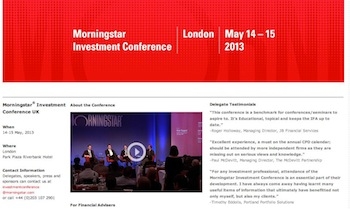Good Financial Planning can help clients achieve up to 29 per cent more retirement income, according to David Blanchett.
Speaking at the Morningstar Investment Conference today, Mr Blanchett, head of retirement research at Morningstar, said that these Financial Planning factors were called Gamma.
Based on US research, the study looked at the principles of Gamma and how these intelligent Financial Planning decisions compared to a naïve approach.
Gamma factors included optimal asset allocation based on total wealth, withdrawal strategy, product allocation and tax-efficient allocation.
In contrast, choosing investment funds to outperform the market was the 'Alpha' choice.
Mr Blanchett said: "Investors arguably put a lot of time and effort into selecting investment funds or managers that they hope will outperform the market- the so-called 'Alpha' decision. However, Alpha is just one of many important decisions that can have a significant effect on retirement ncome."
When asked how the figures would be affecting by changing regulation, Mr Blanchett said: "This theory is based on regulation today and what is the value of good advice. The key takeaway from this research is not the numbers, it's showing that there is real value to helping someone achieve a goal."
However, he said it was fully possible to achieve negative Gamma. He said: "Lots of advisers in the US are commission-based and there's not necessarily a high level of knowledge among advisers. Gamma cuts both ways and you can hurt a client if you don't help them or give them bad advice."
Mr Blanchett used to be a Financial Planner himself and said his clients always asked him how much he had grown their portfolios and dismissed the fact that he had done lots of work to help them achieve their outcome.
Mr Blanchett said for many people, especially younger people, their human capital would be their biggest asset. This is the ability to earn and save.
He said: "Human capital is very bond like, it's like a conservative asset class and means someone young can be very aggressive in their portfolio."
For retirees though the most important issue was to purchase a pension or annuity as 61 per cent of retirees were more worried about running out of money than dying.
Further research will be done in the future to adjust the figures to the UK market.

